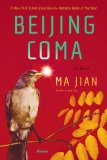Reading Guide Questions

Please be aware that this discussion guide will contain spoilers!
Introduction
Through an interweaving and often overlapping narrative, Ma Jian leads us
through the life of Dai Wei, using memories as his stepping stones from the past to
the present. As we follow Dai Wei from childhood through adolescence to his years
as a student at university, we bear witness to an entire nation’s struggle against
corruption and oppression and its citizens’ collective movement toward freedom.
- What was your initial reaction to the opening passage of the novel, written with
second-person pronouns that appear to address you directly? How did your understanding
of this passage change at the end of the novel?
- In what ways do the political affiliations of his father impact Dai Wei as a child?
How does his mother’s reaction further influence Dai Wei’s life? How do his parents
resolve the clash of family obligation and civic duty?
- Ma Jian writes, “The literal meaning of the Chinese characters for ‘revolution’ is
‘elimination of life’” (p. 55). How does this apply to Dai Wei’s understanding of the
Cultural Revolution in which his father participated? How does this statement play
out in the novel’s themes?
- How does Dai Wei’s attitude toward women develop and progress? What are the
similarities and differences between the relationships he forms with the four primary
women in his life—his mother, Lulu, A-Mei, and Tian Yi?
- How does memory influence the novel’s theme, plot, characterization, and
imagery? In what way do the five senses define and distort Dai Wei’s recollection of
the past—and his recovery in the present?
- Discuss the significance of cultural heritage and identity in Dai Wei and A-Mei’s
courtship. How does geography shape the characters later in the novel, especially in
terms of the various provinces and countries affected by the protests?
- What is the significance of The Book of Mountains and Seas? When he is left with
only his imagination, how does Dai Wei’s recollection of past events, places, and
people merge with his memories of this book in particular?
- How does his mother’s strict adherence and loyalty to the Communist Party affect
Dai Wei? How does this work to both distance mother and son and also bond them
together? After Dai Wei becomes comatose, how does his mother’s sense of nationalism
change?
- Discuss the following quote: “Leaders emerge in times of chaos, and it’s always
the radical ones who gain the support of the people” (p. 175). How does this apply
to the several revolutions and counterrevolutions throughout history? What does it
suggest about the students depicted in the novel, in particular those struggling for
power during the protests?
- What is the role of technology and information industries in Ma Jian’s description
of a modernizing China? How have hand-held cameras, telephones, and the
foreign media transformed the process of protest?
- Discuss the importance and perception of the father figure as portrayed in the
novel, especially as it relates to Dai Wei and his family. How is this mirrored in
other characters? In what respect did the Cultural Revolution of their fathers’ generation
shape their own student movements, which led to the protests of 1989?
- The students seem to have vastly different stances and reasons for protesting.
Discuss the factors of family, society, power, and politics as they influenced this
spectrum of motivations. How would you have responded under similar circumstances?
- What made the hunger strike particularly effective in helping the students gain
the wide support among the Chinese people? Describe the parallels between the
hunger strike and Dai Wei’s comatose state. What does this imply for him both spiritually
and as a revolutionary?
- If Dai Wei had lost his ability to hear, how would his progress have been affected?
How does the fact that Dai Wei can still hear shape his understanding of his
surroundings and knowledge of his former friends?
- What is the source of Master Yao’s influence on Dai Wei and his mother? How
does their life change after Yao is arrested and jailed?
- What were your impressions of the sparrow described in the novel’s closing
scenes? How does the bird capture the potential of a new future for Dai Wei while
relating to his past, especially A-Mei?
- What does Beijing Coma teach us about the dualities of death and rebirth,
despair and hope, and oppression and freedom?
Unless otherwise stated, this discussion guide is reprinted with the permission of Picador.
Any page references refer to a USA edition of the book, usually the trade paperback version, and may vary in other editions.

 Book Reviewed by:
Book Reviewed by:



